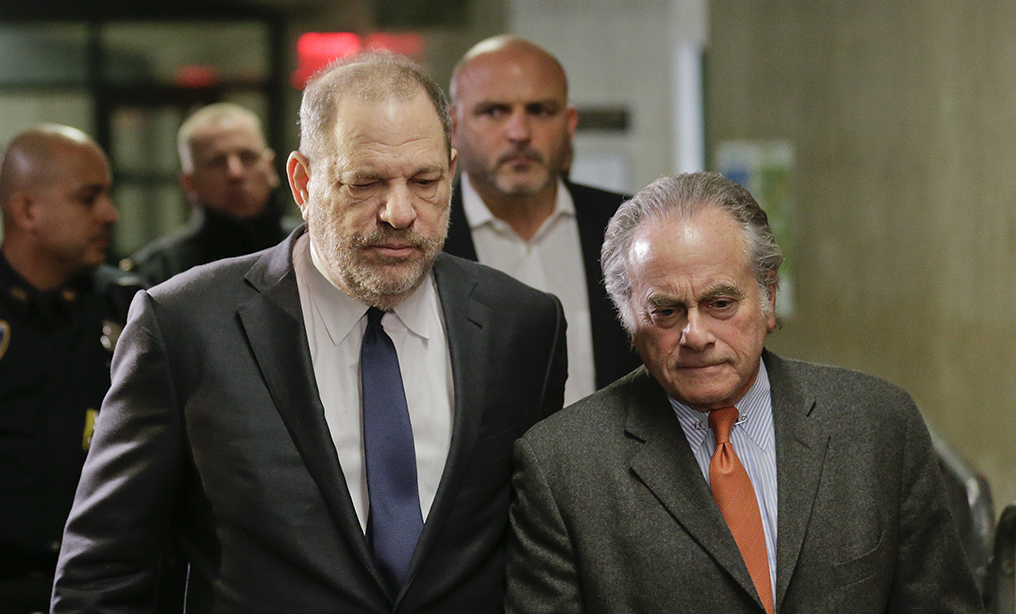Judge Denies Weinstein's Motion to Dismiss Remaining Sexual Assault Charges
Harvey Weinstein's attorney, Benjamin Brafman, had argued that prosecutors failed to present a range of exculpatory evidence to the panel.
December 20, 2018 at 11:57 AM
3 minute read
 Harvey Weinstein, left, arrives at Manhattan Supreme Court with his attorney Benjamin Brafman, Thursday, Dec. 20. (AP Photo/Seth Wenig)
Harvey Weinstein, left, arrives at Manhattan Supreme Court with his attorney Benjamin Brafman, Thursday, Dec. 20. (AP Photo/Seth Wenig)
A New York judge on Thursday denied a motion to dismiss the five remaining criminal charges against Harvey Weinstein, saying attorneys for the disgraced movie mogul had not shown that grand jury proceedings in the case were tainted by police and prosecutor misconduct.
Manhattan Supreme Court Justice James Burke's ruling followed a pivotal hearing Thursday morning on a motion by Weinstein's attorney, Benjamin Brafman, to dismiss the case. Brafman had argued that prosecutors failed to present a range of exculpatory evidence to the panel, including evidence that Weinstein had engaged in a long-term consensual relationship with an alleged victim.
In his decision, Burke said prosecutors had presented evidence in a fair manner and were not obligated to search for evidence favorable to Weinstein's defense at the grand jury stage.
“The court's review of the grand jury minutes shows that the presentation was legally and procedurally proper, and that the people presented evidence in a fair manner,” Burke wrote in a six-page order. “Nor did the people provide a misleading account of the relationship between the defendant and the complainants.”
He also found no basis for Weinstein's allegations of police misconduct or that the case had been influenced by “political pressure” within the Manhattan District Attorney's Office. Burke also denied Weinstein's request for an evidentiary hearing involving the friend of an accuser, whom the defense argued could provide corroborating evidence of the supposedly consensual relationship between Weinstein and his alleged victim.
The parties are next expected to appear in court March 7 for pretrial hearings.
A spokesman for District Attorney Cyrus Vance Jr. would not to comment on Thursday's ruling.
Weinstein faces two charges of predatory sexual assault, which carry a maximum penalty of life in prison, first- and third-degree rape, and a criminal sex act in the third degree.
In October, Burke dismissed one charge amid revelations that a New York City police detective did not tell prosecutors that a witness had provided him with an account that contradicted that of Lucia Evans, who claimed that Weinstein forced her to give him oral sex in 2004.
Brafman, of Brafman & Associates, then moved to dismiss the entire indictment, arguing that the whole case against his client was flawed. On Thursday, Brafman said he was “obviously disappointed” by Burke's ruling and turned his attention to the upcoming trial.
“Nothing in the court's ruling, however, removes the flawed theory of this case that we intend to vigorously defend at trial, where we are confident that Mr. Weinstein will be completely exonerated,” Brafman said.
This content has been archived. It is available through our partners, LexisNexis® and Bloomberg Law.
To view this content, please continue to their sites.
Not a Lexis Subscriber?
Subscribe Now
Not a Bloomberg Law Subscriber?
Subscribe Now
NOT FOR REPRINT
© 2025 ALM Global, LLC, All Rights Reserved. Request academic re-use from www.copyright.com. All other uses, submit a request to [email protected]. For more information visit Asset & Logo Licensing.
You Might Like
View All
Justice 'Weaponization Working Group' Will Examine Officials Who Investigated Trump, US AG Bondi Says

Lawyers Across Political Spectrum Launch Public Interest Team to Litigate Against Antisemitism
4 minute read
'Landmark' New York Commission Set to Study Overburdened, Under-Resourced Family Courts

Trending Stories
- 1States Accuse Trump of Thwarting Court's Funding Restoration Order
- 2Microsoft Becomes Latest Tech Company to Face Claims of Stealing Marketing Commissions From Influencers
- 3Coral Gables Attorney Busted for Stalking Lawyer
- 4Trump's DOJ Delays Releasing Jan. 6 FBI Agents List Under Consent Order
- 5Securities Report Says That 2024 Settlements Passed a Total of $5.2B
Who Got The Work
J. Brugh Lower of Gibbons has entered an appearance for industrial equipment supplier Devco Corporation in a pending trademark infringement lawsuit. The suit, accusing the defendant of selling knock-off Graco products, was filed Dec. 18 in New Jersey District Court by Rivkin Radler on behalf of Graco Inc. and Graco Minnesota. The case, assigned to U.S. District Judge Zahid N. Quraishi, is 3:24-cv-11294, Graco Inc. et al v. Devco Corporation.
Who Got The Work
Rebecca Maller-Stein and Kent A. Yalowitz of Arnold & Porter Kaye Scholer have entered their appearances for Hanaco Venture Capital and its executives, Lior Prosor and David Frankel, in a pending securities lawsuit. The action, filed on Dec. 24 in New York Southern District Court by Zell, Aron & Co. on behalf of Goldeneye Advisors, accuses the defendants of negligently and fraudulently managing the plaintiff's $1 million investment. The case, assigned to U.S. District Judge Vernon S. Broderick, is 1:24-cv-09918, Goldeneye Advisors, LLC v. Hanaco Venture Capital, Ltd. et al.
Who Got The Work
Attorneys from A&O Shearman has stepped in as defense counsel for Toronto-Dominion Bank and other defendants in a pending securities class action. The suit, filed Dec. 11 in New York Southern District Court by Bleichmar Fonti & Auld, accuses the defendants of concealing the bank's 'pervasive' deficiencies in regards to its compliance with the Bank Secrecy Act and the quality of its anti-money laundering controls. The case, assigned to U.S. District Judge Arun Subramanian, is 1:24-cv-09445, Gonzalez v. The Toronto-Dominion Bank et al.
Who Got The Work
Crown Castle International, a Pennsylvania company providing shared communications infrastructure, has turned to Luke D. Wolf of Gordon Rees Scully Mansukhani to fend off a pending breach-of-contract lawsuit. The court action, filed Nov. 25 in Michigan Eastern District Court by Hooper Hathaway PC on behalf of The Town Residences LLC, accuses Crown Castle of failing to transfer approximately $30,000 in utility payments from T-Mobile in breach of a roof-top lease and assignment agreement. The case, assigned to U.S. District Judge Susan K. Declercq, is 2:24-cv-13131, The Town Residences LLC v. T-Mobile US, Inc. et al.
Who Got The Work
Wilfred P. Coronato and Daniel M. Schwartz of McCarter & English have stepped in as defense counsel to Electrolux Home Products Inc. in a pending product liability lawsuit. The court action, filed Nov. 26 in New York Eastern District Court by Poulos Lopiccolo PC and Nagel Rice LLP on behalf of David Stern, alleges that the defendant's refrigerators’ drawers and shelving repeatedly break and fall apart within months after purchase. The case, assigned to U.S. District Judge Joan M. Azrack, is 2:24-cv-08204, Stern v. Electrolux Home Products, Inc.
Featured Firms
Law Offices of Gary Martin Hays & Associates, P.C.
(470) 294-1674
Law Offices of Mark E. Salomone
(857) 444-6468
Smith & Hassler
(713) 739-1250






